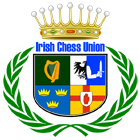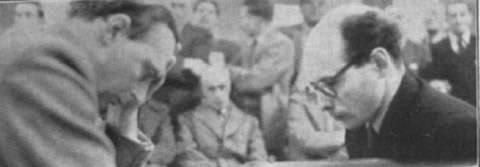Vivid Character
The death of Conel Hugh O'Donel Alexander deprived English chess of one of its most vivid characters. Born 19th April 1909 [in Cork, ed.], he learnt chess at the age of 8. From a Londonderry college he went to King Edward's School, Birmingham, where as a schoolboy he won the Birmingham Post cup, which carries with it the unofficial championship of Staffordshire, Warwickshire and Worcestershire. Going on to Cambridge, he not only won the University championship four years in succession, but picked up first-class honours. He won the British championship in 1938.
Buenos Aries Boat
In 1939 I found myself on a boat with him bound for the Chess Olympiad in Buenos Aires where he was English team captain. Other distinguished members of the team were Sir George Thomas, P.S. Milner-Barry and Harry Golombek. War broke out after about six rounds. With typical determination, Alexander jettisoned chess for patriotism, caught a boat home, volunteered for service on disembarking, and within a few weeks had attained the rank of colonel in British Intelligence. He remained attached to Intelligence and the Foreign Office until his retirement a few months ago. As a curious consequence of this commitment, though he settled in to the team captaincy for the British Chess Federation in the biennial Olympiads and participated in many chess events abroad, he was never allowed to travel anywhere behind the Iron Curtain.
Radio Match
His fame certainly did, however. In the radio match, Britain v USSR in 1946, the most important event in British chess for a decade before and after, he found himself pitted against Mikhail Botvinnik, then at the height of his powers and destined to hold the world championship for 14 years. The first game he lost; the second he won in superb style. His great adversary was outplayed.
Hastings
He had some great years at Hastings. In 1954 a 120 move victory over Bronstein (see picture) in a queen and pawn endgame stretching over 13 hours through 3 days earned headlines in the national press unequalled until the Fischer-Spassky furore of 1972, won him first equal place and started him with a chess column in the Sunday Times. He was level with Bronscein, above O'Kelly, Matanovic, Olafsson, Teschner, Tolush, Tartakover and Wade. Hastings illustrated Alexander's weaknesses as well as his strengths. Twice he won the premier tournament there, only to finish among the tail-enders the year after. Only once more was he to win the British Championship; in a rather weak field, entering at the last minute with typical opportunism.
Mathematician
He was a brilliant conversationalist and speaker, a fine bridge player, a master mathematician (an expert on codes), and a first-class journalist and writer. Among varied other interests were croquet and philately. He threw himself wholeheartedly into anything he did. His organization, The Friends of Chess, provided generous financial support for a wide range of chess events. A few days before his death he was full of plans for the future, including a big History of British Chess. He burnt himself out. The world of chess is a poorer and duller place without him.

